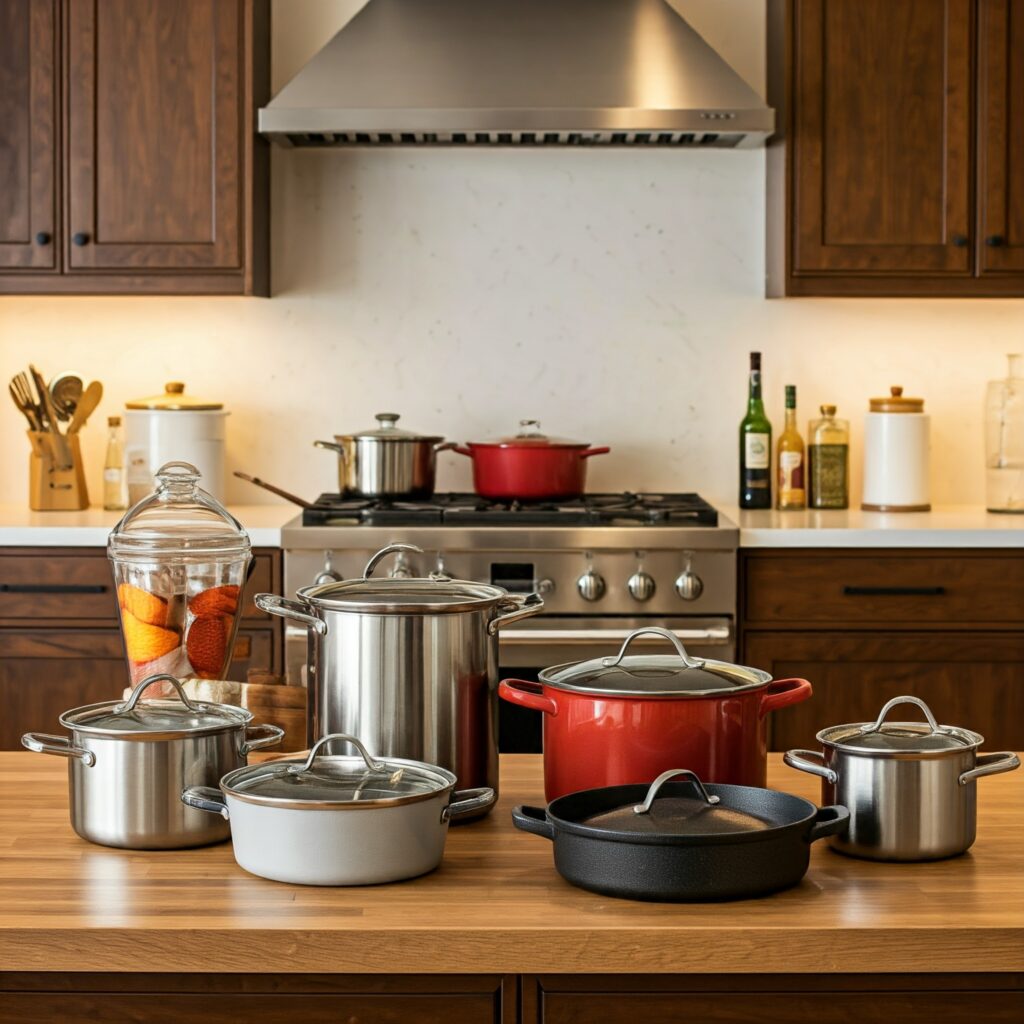HAPPY FALL Y'ALL! --- Check out our HOLIDAY gift ideas!
“Are Teflon Pans Toxic?”: Tales from the Culinary Trenches

Let’s face it, those perfectly smooth, non-stick surfaces of Teflon pans are a kitchen dream come true! Fried eggs glide effortlessly, pancakes flip with a flick of the wrist, and cleanup is a breeze. But lately, there’s been a whisper in the culinary winds, a question lingering in the air like the scent of burnt toast: are Teflon pans toxic?
This question has sparked heated debates in kitchens and online forums, leaving home cooks and decor enthusiasts alike wondering if their beloved non-stick cookware is a friend or foe.
So, let’s grab our metaphorical spatulas and flip over this topic, separating fact from fiction and exploring the non-stick landscape to uncover the truth about Teflon and its potential impact on our health and homes.
Table of Contents
1. “My Grandma’s Cast Iron Pan Could Survive a Nuclear Apocalypse!”: A Nostalgic Look at Cookware Through the Ages
Before we dive into the Teflon debate, let’s take a quick trip down memory lane, back to the kitchens of our grandparents and great-grandparents. Cast iron, enameled steel, copper… these were the workhorses of their culinary adventures, durable, reliable, and seemingly indestructible.
But kitchen trends, like fashion, evolve, and the advent of non-stick surfaces promised a revolution in cooking convenience. Suddenly, eggs didn’t stick, pancakes flipped with ease, and cleaning up was a breeze. Teflon, the miracle coating, became a kitchen staple, transforming the way we cooked and interacted with our cookware.
2. “Teflon? More Like Chemical Concoction!”: Unraveling the Mystery of Non-Stick Coatings
Teflon, the brand name for polytetrafluoroethylene (PTFE), is a synthetic fluoropolymer that creates a slippery, non-stick surface on cookware. It’s this unique property that made Teflon pans so popular, promising effortless cooking and easy cleanup.
However, the chemical composition of Teflon, and the potential for these chemicals to leach into food during cooking, is at the heart of the “are Teflon pans toxic” debate.
3. “Is My Kitchen a Science Lab?”: PFOA and the Teflon Controversy
Perfluorooctanoic acid (PFOA), once used in the manufacturing of Teflon, is a persistent organic pollutant that has been linked to potential health concerns. The good news is that PFOA has been phased out of Teflon production since 2013.
However, the legacy of PFOA, and the ongoing debate about the safety of other chemicals used in Teflon production, continues to fuel concerns about the toxicity of non-stick cookware.
4. “My Pans Are Smoking!”: The Overheating Hazard
While the question of whether Teflon itself is toxic is complex, one thing is clear: overheating Teflon pans toxic can release harmful fumes. These fumes, while not a long-term health concern, can cause flu-like symptoms, known as “polymer fume fever,” in humans and can be fatal to birds.
Tip: Avoid heating Teflon pans toxic to high temperatures, and always use proper ventilation when cooking.
5. “Scratched Pans, Scrambled Chemicals?”: Addressing Wear and Tear Concerns
Over time, Teflon coatings can scratch, chip, and wear away. This raises concerns about the potential for these particles to be ingested with food. While the amount of Teflon that might flake off is generally considered small, it’s a factor to consider when evaluating the safety of non-stick cookware.
Tip: Replace scratched and damaged Teflon pans to minimize potential risks.
6. “Stainless Steel for the Win?”: Exploring Alternative Cookware Options
With the ongoing Teflon debate, many home cooks and decor enthusiasts are exploring alternative cookware options. Stainless steel, cast iron, ceramic-coated, and enameled cookware offer a range of benefits, from durability and heat retention to chemical-free cooking surfaces.
Tip: Consider your cooking style, budget, and health concerns when choosing the best cookware for your needs.
7. “Are My Pans Plotting Against Me?”: Debunking Common Teflon Myths
The internet is a breeding ground for misinformation, and the Teflon debate has spawned its fair share of myths and exaggerations. Here are a few common misconceptions:
- Myth: Teflon pans toxic properties will give you cancer.
- Fact: While some chemicals used in Teflon production have been linked to potential health concerns, there is no conclusive evidence that Teflon itself causes cancer.
- Myth: Teflon pans toxic are instantly dangerous when scratched.
- Fact: While it’s a good idea to replace scratched pans, a few scratches won’t turn your kitchen into a toxic wasteland.
- Myth: All non-stick cookware is Teflon.
- Fact: There are many types of non-stick coatings, some of which are considered safer than Teflon.
8. “Cooking with Confidence!”: Making Informed Choices About Non-Stick Cookware
Navigating the world of cookware can feel overwhelming, especially with conflicting information about the safety of Teflon and other non-stick coatings.
Here are a few tips for making informed choices:
- Do Your Research: Read reviews, compare brands, and learn about the different types of non-stick coatings available.
- Choose Reputable Brands: Opt for cookware from well-known manufacturers that prioritize safety and quality.
- Consider Your Needs: Think about your cooking style, budget, and health concerns when selecting cookware.
- Use Cookware Properly: Avoid overheating non-stick pans, and always use proper ventilation when cooking.
9. “Beyond the Pan!”: Creating a Kitchen That Reflects Your Style and Values
Your kitchen is more than just a place to cook; it’s a reflection of your personality, your style, and your values. Whether you embrace the sleek modernity of stainless steel, the rustic charm of cast iron, or the vibrant hues of ceramic-coated cookware, let your cookware choices reflect your unique taste and enhance the overall aesthetic of your kitchen.
Tip: Coordinate your cookware with your kitchen decor, creating a cohesive and visually appealing space.
10. “Bon Appétit!”: Enjoying the Culinary Journey
Ultimately, the question of “are Teflon pans toxic” is a complex one with no easy answers. While concerns about the safety of certain chemicals used in Teflon production are valid, the overall risk to human health is generally considered low when cookware is used properly.
By staying informed, making conscious choices, and using cookware responsibly, you can enjoy the convenience of non-stick surfaces while minimizing potential risks. After all, the kitchen should be a place of joy, creativity, and culinary exploration, a space where you can confidently whip up delicious meals and create lasting memories.







